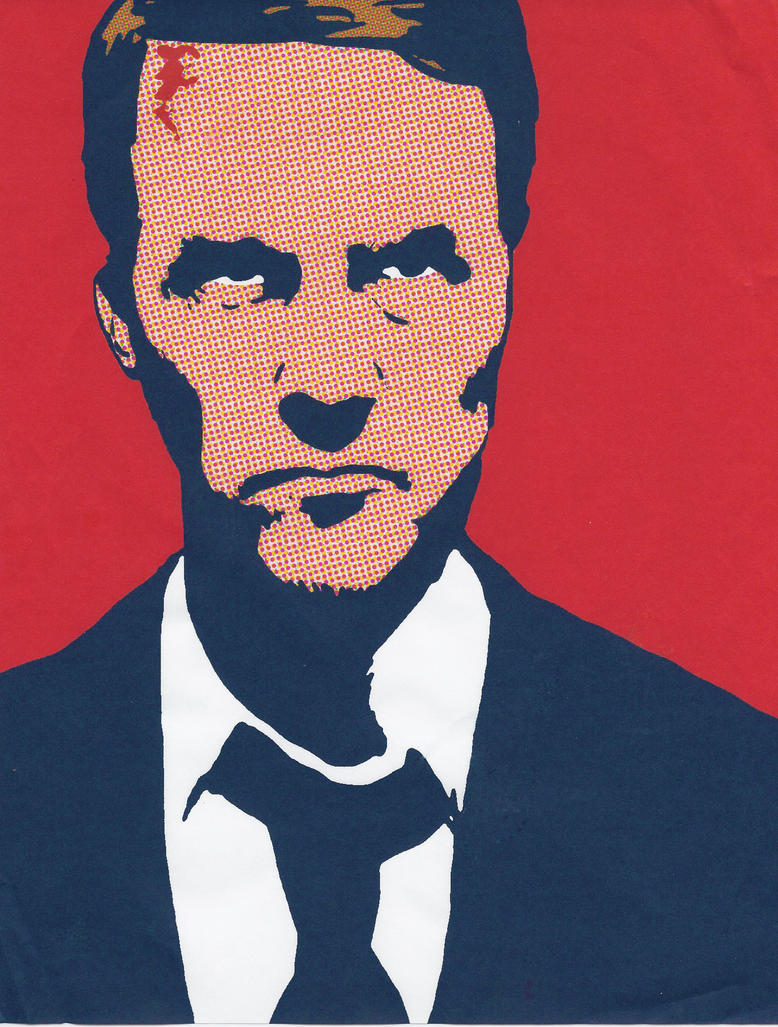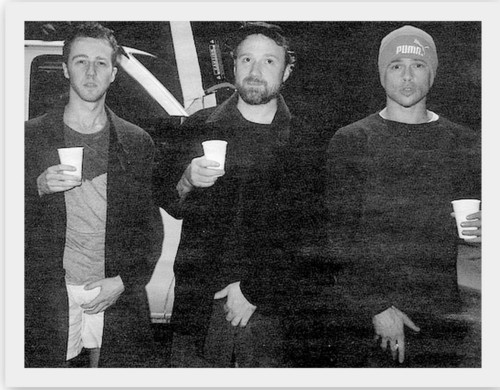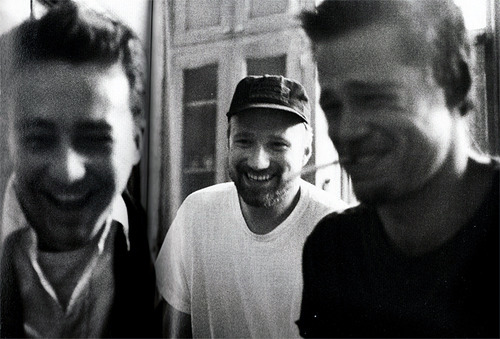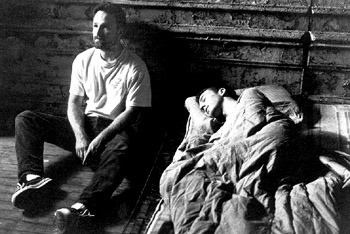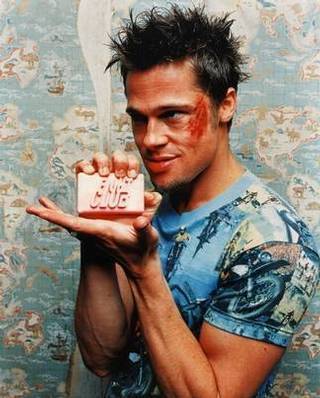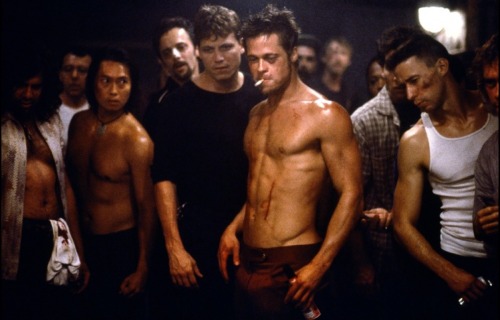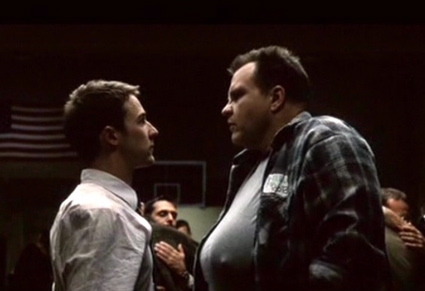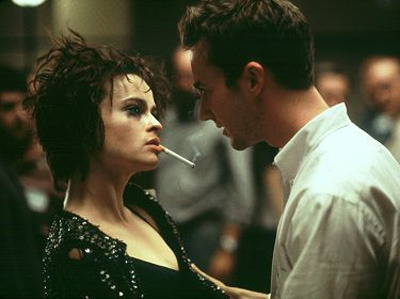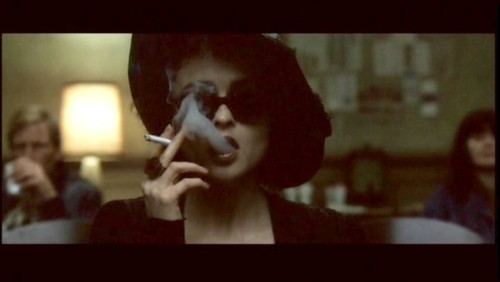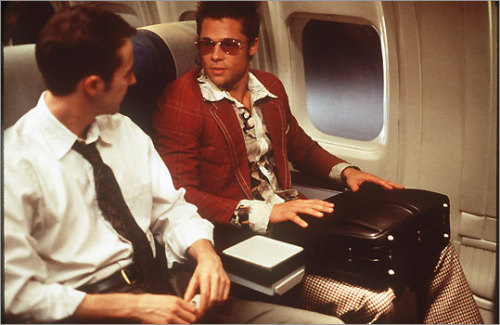
The Redemption of Guilt
Characters from Cider House Rules, Thirteen Conversations, and Fight Club take guilt into their own bloody hands.
“Cut my life into pieces, this is my last
resort.”
—Papa Roach, Infest, 2000
Where has all the guilt gone? It’s
the echoing cry of Sunday morning voices everywhere. But it turns out that
true guilt is painfully ironic, turning up so often it still seems the hardest
thing to get rid of.
Notwithstanding the humanistic projects of the twentieth century,
the “revenge
of conscience” continues
to linger over the human experience like dew over miles of grass—felt,
but barely seen. Unless, that is, you visit the cineplex every now
and then. In the ubiquitous cineplex large screens mechanically provide images
that hordes of people mechanically pay to absorb. The nature
of an encounter with a large screen is what it is. Or is it? Off the screen,
one would hardly expect the lives of a working-class apple-picker, high-class
attorney, and middle-class corporate slave to share meaningful closeness
or depth. But on the screen, in the by-now-tired mantra of
American Beauty,
look closer.
I
will stop myself
Cider House Rules (1998) brought
John Irving’s book and moral vision to cineplex screens,
prompting an array of cultural conversation—from the ethical specificity
of abortion to the more general and philosophical ethics of the role of law
in society. Morality and its personal and social significance sit on the
cultural hot seat as we are introduced to Dr. Larch (Michael
Caine) and Mr. Rose (Delroy
Lindo).
As a doctor in an orphanage, Dr. Larch passionately preaches
and embodies the utilitarian spirit:
What is important is doing something
in order to be of use. As a working-class
apple-picker on a farm, Mr. Rose voices and lives his moral choices from
a perspective that is hyper-individualistic:
Whose business is
it? In seemingly every scene with Mr. Rose,
he inundates us with that probing and haunting question. Throughout
the story of
Cider House Rules we
see the progressive impact of Mr. Rose’s moral philosophy as it eventually
joins streams with the specific topic of abortion, and, perhaps more importantly,
with his own bloodstream.
If Drew Carey’s
Whose
Line Is it Anyway? is
ever in need of a ratings-twist, he might consider reinventing the show
as a new “reality-morality show” set in the Cider House:
Whose
Business Is it Anyway? The confrontation
scene in the apple orchard between Homer (Tobey Maguire) and Mr.
Rose is particularly revealing and edgy as Mr. Rose defaults to his favorite
question. Out of breath and out of his mind, Homer—who is morally
perplexed throughout the film—comes running up to Mr. Rose asking
him if it was true about his daughter. To the question of his alleged
incest and the resulting pregnancy, Mr. Rose responds, “It’s
not your business.”
Whose
business is it anyway? Without forgetting
that Irving is intentionally inserting humanity and complexity into the
argument for abortion, he is also suggesting rather earnestly—through
this and subsequent interactions between Homer and Mr. Rose—that
morality is a private thing, and it is best for all of us to keep it
that way.
Living in a reality-morality that does not exceed our
private intuition, experience, or conviction surely has its pick of consequences.
One near-inevitable consequence is that we are necessarily left in
the private (and lonely) position of taking care of our own guilt.
That is, if it genuinely bothers us. It bothered Mr. Rose.
A raggedy, uncomfortable cot serves as a fitting deathbed
for Mr. Rose as he explains to Homer that his daughter had run off in the
middle of the night. He attempted to reach out and stop her (with his
hands no less), but she knifed him in the stomach. As Homer
evaluates Mr. Rose’s wounds, he notices there is a second and distinct cut
in his abdomen. “I did that with my own knife,” says Mr. Rose. “Sometimes
you gotta break some rules to put things straight.”
The business of
his guilt had become such that his final request and last resort is to
be left
to himself and
with himself as he bleeds to death
in the cider house. Significantly, the cider house is the very place
he and Homer burned the sheet of posted rules they had judged irrelevant
and useless. This symbolic rule-burning is, in fact, one
of the most dramatic moral statements in the film. But as we are left to
ponder the remorse of Mr. Rose, a larger symbolism begins to
eclipse this burning: the symbolism of a guilty man wanting
to be left alone with his
business.
I
will remind myself
Part of the narrative style of
Thirteen
Conversations About One Thing (2002) is to use the power of
proverb as a storytelling technique. Periodically the action, dialogue,
and overall movement within the film are allowed a pause as we
see a quote or phrase presented to us on a black screen with white
letters. It seems appropriate: in these “pauses” we are given
our own brief pause to reflect. Strangely, as we are forced to pause,
in film as in life the messages become less black-and-white.
One of the more provocative messages vying for our attention and reflection
comes in the form of two explosive words: “Fuck Guilt.” Although embedded in several
characters, the irony and complexity of this message comes home to roost
most poignantly in Troy (Matthew
McConaughey).
On a typically fateful rainy night Troy is driving himself
home when the moral moment happens. He has just finished “happy
hour” and
is taking his usual cross street when the high-class attorney accidentally
runs over something large he did not see. Troy’s horror is humanized
as he discovers the body of a young woman in a heap along the curb. Classically—like
some Adamesque representative for all of us—he begins to back away
and look around for a fig leaf. The best he can do is to get in his car and
drive off.
Car commercials have insisted for years that being inside
their car is the escape we all need. Troy probably believed that sedating
pitch when he purchased his silver BMW. But even if the commute is long you
have to get out at some point, and this seems to be the point of Troy’s
moral dilemma. Instead of the guilty pleasure of finding his car to be an
escape, Troy seems unable to hide from his guilt, and he eventually decides
he must sell the car in order to get out at some point.
The damage guilt creates is not always visible, but as
Thirteen Conversations moves
along we become privy to the combustion within Troy because it spills over
onto his face. Leftover from his accident, a small cut over his right temple
cracks open a theological window into the subject of guilt, the way it works
in us and on us, and our human and inhumane attempts to rid ourselves of it.
No moment in Troy’s journey of conscience is more raw
than when he resorts to keeping his wound alive and unwell by cutting it
with a disposable razor and then re-applying his band-aid. In the experience
of genuine guilt, his conscience assertively begins to trump the silliness
of the self-medicating “Fuck Guilt” propaganda he and his lawyer
colleagues would drink to after a hard day at the office. His conscience
does not allow his memory to fade and is somehow demanding of
his body a physical reflection of his guilt. Then, like something anachronistic
to Shakespeare, his conscience finally overwhelms him and prompts an appropriate
retribution.
Day after day Troy stands before himself in the mirror.
Day after day he notices the cut beginning to heal even as he himself remains
unhealed and profoundly marked. Day after day he sees no real and true escape
from the guilt because he sees no real and true escape from himself. And
it is in this moment he decides to make it so memorable that he can
never escape.
I
will redeem myself
Quoting a line from a Bill Murray film is still one of
life’s secret pleasures. In
Caddyshack his
eccentric greens-keeper character begins to recount a supposed golf outing
with the Dalai Lama. Upon meeting the Lama, Murray’s character describes
the look and aura of the man with the wry: “Striking. Very striking.”
Though an obvious pun,
striking is still the best way I know to articulate
the personal effect
Fight Club (1999) leaves
on me every time it views me. Among other hit-out themes Chuck Palahniuk’s
novel-cum-movie delves into consumerism—the
ism that
dare not speak its name. One of our culture’s most anointed ideologies,
consumerism takes a beating in
Fight
Club, yet it still remains to be seen if any of the beatings can redeem
guilt.
Having lost all his material possessions in an apartment
fire, “Jack” (Ed Norton) is
bemoaning his current state and current identity status while sitting in
a diner with Tyler (Brad Pitt).
Raise your hand if you’ve ever been on the other end of diner-booth bitching.
Although Tyler is somewhat sympathetic to Jack, he cuts through the psychobabble:
“The stuff you own ends up owning you.” And so begins one of those conversations
you simply must take outside.
Provocative conversation is strewn all about
Fight Club, but the conversation
that seems to prop the others is the “confessional” in the middle
of the diner parking lot. Tyler confesses to Jack, “I don’t want
to die without any scars.” The
transcendent significance of this admission lies in the constituting fight
that follows and in the movement of fighting it sparks. For that reason,
the diner parking lot is as defining to the
Fight
Club story as the school
parking lot is to
Grease and
the shopping mall parking lot to
Back
to the Future.
When Tyler first names and proclaims the underground movement
“Fight Club,” he also institutes the first precepts of the club.
Even house-churches need a form of dogma and tradition. But ultimately, as
Jack remembers, “It
wasn’t about words.” The most authentic
text was the literal
flesh-and-blood experience of fighting. In “Fight Club,” quite
naturally, the fight is the text that confesses identity and gives meaning.
Complementing the authoritative
text of fighting is the analogy of
worship explicit
in Jack’s re-telling of the beginnings of
“Fight Club.” Specifically, the comparison to a Pentecostal
gathering is rather illuminating because the Pentecostal worship tradition
unabashedly leaves room for and encourages physical expression in worship.
What becomes clear through the overnights at “Fight Club” is
that the
worship it encourages is a more authentic effort to engage
guilt than, let’s say, the standard self-help recovery groups and
group-therapy enterprises (not to mention some of the Sunday-morning practices
of churchgoers). This explains Jack’s theological reflection: “When
the fight was over, nothing was solved, but nothing mattered. Afterwards,
we all felt saved.”
Fight Club is
always an occasion to reflect on first things—cultural and, in a surprise
move, theological. In one sense
Fight Club has
the mystical and mythical significance of blood dead on. Archetypal stories
of redemption often maintain blood as essential to the experience of redemption,
including the cleansing of guilt. But if blood is essential to redemption
stories,
whose blood is still the primary question of any redemption
story—Jack’s or otherwise. Even after the many converts of “Fight
Club” embrace
its way-of-life scars as their text for confronting guilt, the question remains:
Can you really beat and bleed it out yourself if you’re sincere enough,
or if you “feel
it” enough? The
first rule of redemption is . . .
Apple-pickers, Attorneys,
and Alter-egos
Depending on the circumstances, the gentle cut of conscience
might prompt last resorts of a previously unthinkable nature. The intersection
where Mr. Rose, Troy, and Jack meet is indeed an unthinkable place: all have
symbolically and physically decided that
salvation must be something you ceremonially inflict upon yourself.
The opposite and more painful choice—as paradox would
have it—is allowing wounds that have been inflicted on someone else to
become your salvation. Seeing ourselves through another’s
ceremonial
infliction is counter-intuitive, not to mention counter-cultural, which is
why sight is only gifted to the pure in heart. And so, guilt remains a human
experience experienced in high-definition, even as very few have the right
medium for seeing clearly.
According to the Christian vision, this way of seeing
must happen—if we ever hope to quench the conscience’s thirst for satisfaction,
and if we ever hope to really live. The Christian message centered in Jesus
Christ invites humanity to arrive (and to continue arriving) at the moral
need that conscience awakens: the need to experience a transcendent grace
and forgiveness in order to deal with our ever-immanent guilt.
On the subject of guilt Thomas
Merton writes, “How wise
is the Church when she sings of Adam’s happy fault.”
Felix
culpa. He goes on to say, “The inner recesses of our conscience,
where the image of God is branded in the very depths of our being, ceaselessly
remind us that we are born for a far higher freedom.” To be sure,
there are quite a few exchanges with this kind of freedom, but they pale
when compared to the greatest loss, which is captured so beautifully in the
old Christian hymn: “Sinners
plunged beneath the cross lose all their guilt and stain.” Thankfully,
we also lose the need for self-salvation.
Nathan
Elmore lives
in Salem, Oregon, with his wife, Amie, and 2-year-old son, Camden,
who in the spirit of conscience (and avoidance of consequences) is developing
quite a politically quick “I’m sorry.”
Nathan notes a debt
to Read Schuchardt's brief discussion of Fight Club in
the article “Moving Pictures” written for the former regeneration
quarterly.












 Title : Fight Club
Title : Fight Club